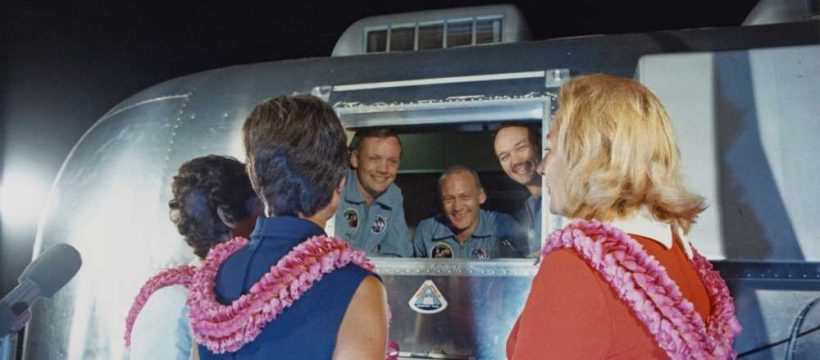The success of Apollo 11 was lauded as one of man’s greatest achievements and sparked a historic surge of support for space exploration that is being revived in modern times.
But behind the headlines and an international victory tour were several devastating personal tragedies that have been partially credited with driving the mission.
The first was the death of Apollo 11 commander Neil Armstrong’s toddler daughter Karen, from a brain tumor, in 1962.
According to Armstrong’s only authorized biographer, James Hansen, the shadow of Karen’s death at the age of 2 haunted him throughout his life, including during some of his most momentous periods.
Hansen said this showed during “the Giant Step tour” for the returned Apollo 11 pilots, which stopped in “all the major capitals of the world.”
“When they were in London, there was an event at Buckingham Palace. And the astronauts were on stage,” Hansen said during an interview to promote the film “First Man,” based on his biography.
While the trio was waiting at a press event to meet the Queen at Buckingham Palace, Armstrong was drawn to help a woman and her child.
“There was an English woman and her child, a little blond 2- or 3-year-old child, who was in the audience. And the little girl was crying,” Hansen said.
“Neil got off the stage, went over to the mother and the child, took the child, started to talk to the child. The mother gave him the child to hold. He comforted her and smiled at her, gave her back to the mother, came back on stage.”
Hansen said: “To me, events like that, things like that, suggest something about Armstrong and the emotional connection that had to be. It had to be the daughter coming back into his life in some respect.”
But at the time, the significance of the interaction was lost on observers, according to Hansen.
“It was mentioned in the press. Although, the connection between doing that and his own daughter was not mentioned in any of the press coverage because they were unaware that he even had a daughter,” Hansen said.
“Those things were very powerful for me as a biographer.”
Armstrong and indeed the wider space community were also starkly influenced by the deaths of several of their peers in the Apollo 1 tragedy, in which three crew members died during a fire in a simulated launch in February 1967.
The accident was also a devastating blow for the families left behind, who at times felt like it was not given sufficient attention in the years that followed.
Bonnie White Baer, whose mother, Patricia, suffered from depression after the death of her husband, mission commander Ed White, said recent attention had helped their recovery. Patricia White took her own life in 1991.
“I think for a long time it was a little bit of a sore subject, about Apollo 1,” White Baer said in an interview to promote “First Man,” which partially told her mother’s story.
“It’s been somewhat, with my family, not great. But, they just now started doing some things,” such as an Apollo 1 memorial, she said.
“That was a long time coming, but they did finally do it so I’m happy. But, a lot of the stuff really was sort of, nobody wanted to talk about it because it was sort of a failure and a bad subject. It was hard. I think it’s well past time but certainly time that this story is out there.”
And all of this, of course, took place against a backdrop of a nation grieving for the loss of two members of its first family.
It had been then-President John F. Kennedy’s desire to conquer space before the end of the 1960s. After his death in 1963, and that of his brother, Robert Kennedy, Americans were reeling, according to NASA’s chief historian, Bill Barry.
“I was a kid at the time, but I remember walking into the kitchen one morning, I was getting ready to go to school. My mom, who is like this titan of holding the family together in difficult circumstances, and she’s crying and it really upset me, because, it’s like, “Ma, what are you crying for?” he recalled.
“It was because Bobby Kennedy had been assassinated the night before. And people were really affected by the turmoil of that and so, and people were wondering, why are we spending all this money going to space when we got all these problems on planet Earth?
“Well, typically people look back at Apollo in this kind of glow about it: We did this great thing and everybody was supporting the space program, and it had an infinite budget.
“The reality was, it’s messy, and it was hard, and people weren’t supportive. The only time that the polls in favor of going to the moon went above 50 percent was the week that we went to the moon on Apollo 11. They were below 50 percent support before that and they were below that after that. In fact, pretty dramatically after that, it tailed off pretty fast.”
Source: Read Full Article


